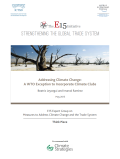The long-standing reaction of the trade community to attempts to embroil trade law and policy in the resolution of the climate change issue has been to say, “Solve your own problems on the basis of your own agreed multilateral instruments, and when you have, if there are interfaces or overlaps between your regime and the trade regime, we will find means of resolving them constructively.” While this is understandable, it is rendered impractical, first by that an effective set of agreed international climate mitigation policies, which stand a chance of allowing the achievement of the agreed objectives, is probably as far away now as it has ever been; and second by that the development of domestic politics in both developed and developing countries has revealed trade to be in principle a major source of carbon and political leakage from any aggressive mitigation regime, and thus a serious constraint on national and international mitigation plans.
In the wake of the Copenhagen Accord in 2009 and amid frustration with the slow pace of the United Nations Framework Convention on Climate Change (UNFCCC) talks, a number of bilateral and plurilateral efforts and technology initiatives has been launched to deal with international climate policy. Bilateral efforts such as the November 2014 joint announcement between the United States (US) and China have provided welcome momentum. These minilateral efforts, together with the broader multilateral ones, constitute the emerging “regime complex” for climate change. In such a world, ambition in climate action must come from national governments as well as from international agreements. For promoting such ambition, key tools include market-based mechanisms that cap emissions of carbon dioxide and other global warming pollutants, and allow nations and firms that reduce emissions below capped levels to save, sell, and trade surplus units of allowable emissions. Such systems are in effect today in more than 50 countries, states, cities, and provinces where almost a billion people live.

Despite diverse efforts in the past two decades, countries have not been able to create an international climate change regime that effectively addresses the challenges at stake. Meanwhile, the Arctic Ocean keeps melting, an area the size of Costa Rica is lost to deforestation every year, and low-lying islands could disappear by 2050 due to a rise in sea level. There are several other huge challenges posed by climate change, which urgently call for serious international action.
Adaptation presents developing countries with the ultimate dual challenge – building a rapidly evolving, sustainable economy within an environment increasingly altered by the impacts of climate change. To meet this challenge, adaptation policy must find balance and create synergy between the two, as climate resilience and economic resilience go hand in hand.
Economic development is associated with structural change, including an evolving sector composition, the emergence of new comparative advantages and skills, and shifts in consumer demand as a result of rising incomes – all of which has implications for adaptation. Existing attempts to adapt developing economies to climate change have nonetheless ignored these economic dynamics. Current approaches to adaptation often seek to preserve current structures, for example by protecting agricultural output, which neither acknowledges nor takes advantage of the fact that the status quo is evolving.
Outsourced emissions are a major loophole in current efforts to tackle climate change and build a green economy. International flows of carbon embedded in trade have grown considerably since the 1992 Rio summit, with developed northern nations benefiting unjustly from effectively outsourcing pollution to developing southern states. The world needs to agree to the principle of Clean Trade Agreements. These arrangements, negotiated between states and regions, would come to replace Free Trade Areas and build mutually-agreed carbon constraints into the terms of trade. Clean Trade Agreements would aim to halt the ‘race to the bottom’ witnessed as globalisation has unfolded – where industry invariably migrates to regions with the least stringent environmental regulations – and reverse the growth in outsourced emissions.
